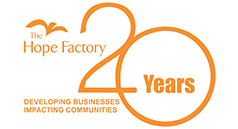Negotiating a future for the Eastern Cape's youth

It has become a fashion statement for young people in the Eastern Cape to seize skills development opportunities.
The Hope Factory, a Thuthuka Wealth Creation project, in partnership with the Department of Labour, has afforded 24 historically disadvantaged young people a chance to showcase their newly acquired skills in a fashion show held in Port Elizabeth on 23 March 2006.
The Hope Factory, one of the South African Institute of Chartered Accountants' (SAICA) Corporate Social Investment (CSI) projects, has won a 2005 Community Builder of the Year Award (emerging companies category).
The Hope Factory, founded in 2001, has been creating opportunities for people from disadvantaged backgrounds to be trained in business, technical and life skills. It has organised the fashion show to celebrate the graduation of their trainees and its investment in people of the Nelson Mandela Metropole.
Previously disadvantaged young people are empowered to start their own businesses, seek formal sector employment, study further or join The Hope Factory Job Creation corporate gifts project.
The Hope Factory has been instrumental in providing opportunities for the unemployed to become financially productive and to gain practical work experience. Thus far, 234 trainees have benefited from The Hope Factory's programmes, with an additional 108 expected to benefit from the project by the end of 2006.
Through SAICA, the accounting profession supports The Hope Factory by purchasing and providing a market for its corporate gifts and conferencing materials that are manufactured in the Job Creation project.
The fashion show will showcase the first intake of 2006 trainees emerging from the Hope Factory's Eastern Cape branch in Port Elizabeth.
Elizabeth Zambonini, SAICA's CSI Project Manager, says: �The Hope Factory is about restoring self-respect and dignity and contributing to the rebuilding of our nation through education and the empowerment of every individual.
Bongi Magongo, a trainee in the project, says: �The Hope Factory has helped me express my creativity and I have learnt to create corporate gifts.�
Another trainee, Mandisa Cakwebe, expressed her joy: �I no longer idle at home; I have learnt to communicate with others, and to negotiate in a business sense.�
The Hope Factory is supported by the Department of Labour and the Accounting Profession, through SAICA's Thuthuka Project.










